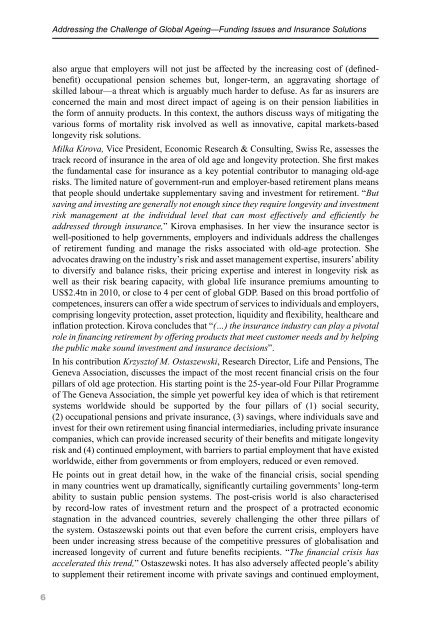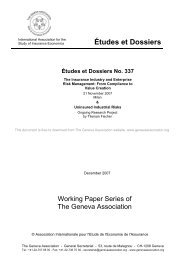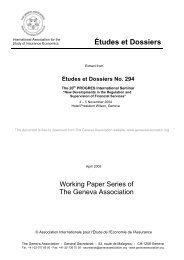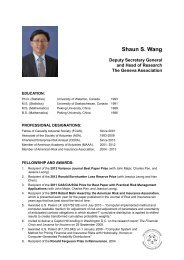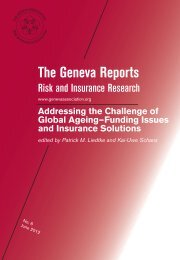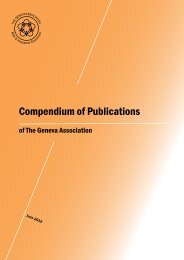Addressing the Challenge of Global Ageing—Funding Issues
Addressing the Challenge of Global Ageing—Funding Issues
Addressing the Challenge of Global Ageing—Funding Issues
You also want an ePaper? Increase the reach of your titles
YUMPU automatically turns print PDFs into web optimized ePapers that Google loves.
6<br />
<strong>Addressing</strong> <strong>the</strong> <strong>Challenge</strong> <strong>of</strong> <strong>Global</strong> Ageing—Funding <strong>Issues</strong> and Insurance Solutions<br />
also argue that employers will not just be affected by <strong>the</strong> increasing cost <strong>of</strong> (definedbenefit)<br />
occupational pension schemes but, longer-term, an aggravating shortage <strong>of</strong><br />
skilled labour—a threat which is arguably much harder to defuse. As far as insurers are<br />
concerned <strong>the</strong> main and most direct impact <strong>of</strong> ageing is on <strong>the</strong>ir pension liabilities in<br />
<strong>the</strong> form <strong>of</strong> annuity products. In this context, <strong>the</strong> authors discuss ways <strong>of</strong> mitigating <strong>the</strong><br />
various forms <strong>of</strong> mortality risk involved as well as innovative, capital markets-based<br />
longevity risk solutions.<br />
Milka Kirova, Vice President, Economic Research & Consulting, Swiss Re, assesses <strong>the</strong><br />
track record <strong>of</strong> insurance in <strong>the</strong> area <strong>of</strong> old age and longevity protection. She first makes<br />
<strong>the</strong> fundamental case for insurance as a key potential contributor to managing old-age<br />
risks. The limited nature <strong>of</strong> government-run and employer-based retirement plans means<br />
that people should undertake supplementary saving and investment for retirement. “But<br />
saving and investing are generally not enough since <strong>the</strong>y require longevity and investment<br />
risk management at <strong>the</strong> individual level that can most effectively and efficiently be<br />
addressed through insurance,” Kirova emphasises. In her view <strong>the</strong> insurance sector is<br />
well-positioned to help governments, employers and individuals address <strong>the</strong> challenges<br />
<strong>of</strong> retirement funding and manage <strong>the</strong> risks associated with old-age protection. She<br />
advocates drawing on <strong>the</strong> industry’s risk and asset management expertise, insurers’ ability<br />
to diversify and balance risks, <strong>the</strong>ir pricing expertise and interest in longevity risk as<br />
well as <strong>the</strong>ir risk bearing capacity, with global life insurance premiums amounting to<br />
US$2.4tn in 2010, or close to 4 per cent <strong>of</strong> global GDP. Based on this broad portfolio <strong>of</strong><br />
competences, insurers can <strong>of</strong>fer a wide spectrum <strong>of</strong> services to individuals and employers,<br />
comprising longevity protection, asset protection, liquidity and flexibility, healthcare and<br />
inflation protection. Kirova concludes that “(…) <strong>the</strong> insurance industry can play a pivotal<br />
role in financing retirement by <strong>of</strong>fering products that meet customer needs and by helping<br />
<strong>the</strong> public make sound investment and insurance decisions”.<br />
In his contribution Krzyszt<strong>of</strong> M. Ostaszewski, Research Director, Life and Pensions, The<br />
Geneva Association, discusses <strong>the</strong> impact <strong>of</strong> <strong>the</strong> most recent financial crisis on <strong>the</strong> four<br />
pillars <strong>of</strong> old age protection. His starting point is <strong>the</strong> 25-year-old Four Pillar Programme<br />
<strong>of</strong> The Geneva Association, <strong>the</strong> simple yet powerful key idea <strong>of</strong> which is that retirement<br />
systems worldwide should be supported by <strong>the</strong> four pillars <strong>of</strong> (1) social security,<br />
(2) occupational pensions and private insurance, (3) savings, where individuals save and<br />
invest for <strong>the</strong>ir own retirement using financial intermediaries, including private insurance<br />
companies, which can provide increased security <strong>of</strong> <strong>the</strong>ir benefits and mitigate longevity<br />
risk and (4) continued employment, with barriers to partial employment that have existed<br />
worldwide, ei<strong>the</strong>r from governments or from employers, reduced or even removed.<br />
He points out in great detail how, in <strong>the</strong> wake <strong>of</strong> <strong>the</strong> financial crisis, social spending<br />
in many countries went up dramatically, significantly curtailing governments’ long-term<br />
ability to sustain public pension systems. The post-crisis world is also characterised<br />
by record-low rates <strong>of</strong> investment return and <strong>the</strong> prospect <strong>of</strong> a protracted economic<br />
stagnation in <strong>the</strong> advanced countries, severely challenging <strong>the</strong> o<strong>the</strong>r three pillars <strong>of</strong><br />
<strong>the</strong> system. Ostaszewski points out that even before <strong>the</strong> current crisis, employers have<br />
been under increasing stress because <strong>of</strong> <strong>the</strong> competitive pressures <strong>of</strong> globalisation and<br />
increased longevity <strong>of</strong> current and future benefits recipients. “The financial crisis has<br />
accelerated this trend,” Ostaszewski notes. It has also adversely affected people’s ability<br />
to supplement <strong>the</strong>ir retirement income with private savings and continued employment,


